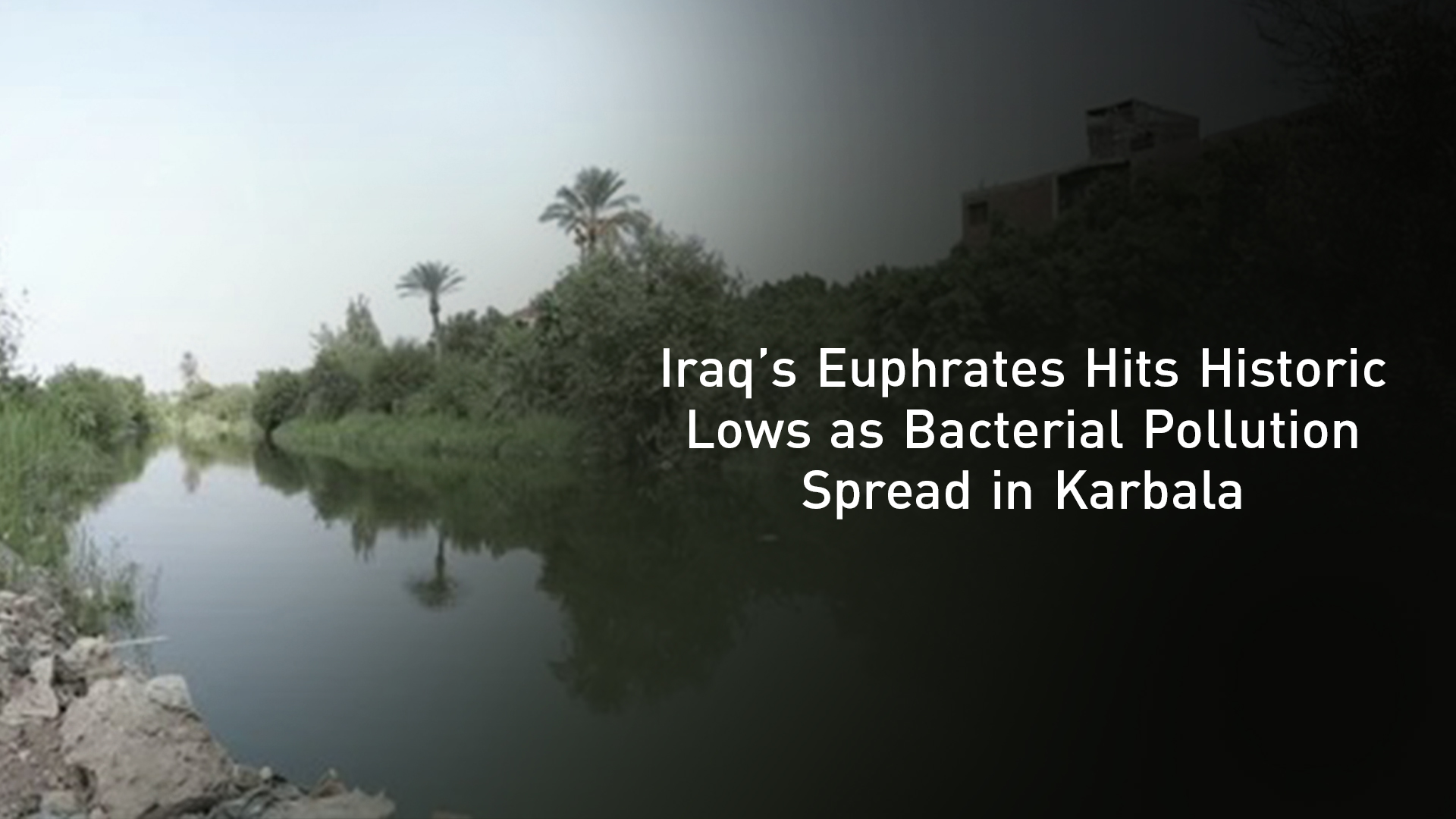Iraq’s Euphrates Hits Historic Lows as Bacterial Pollution Spread in Karbala
Iraq’s 46 million residents face unprecedented water shortages as the Euphrates hits historic lows, fueling algae blooms, bacterial pollution, and ecosystem threats in southern provinces like Karbala.

ERBIL (Kurdistan24) — Iraq’s Euphrates River has sunk to historically low levels, exacerbating the country’s worst water crisis in living memory and threatening both public health and fragile ecosystems, officials and experts said this week.
With a population of 46 million, Iraq is experiencing year-on-year droughts, extreme temperatures, and chronic water scarcity. The situation has been particularly dire in the south, where reduced water flow is fueling pollution, algae blooms, and invasive plant growth, according to AFP.
“In recent weeks, the Euphrates has seen its lowest water levels in decades, particularly in the south,” said Hasan al-Khateeb, an expert at the University of Kufa.
Authorities warn that Iraq now receives less than 35 percent of its allocated share of the Tigris and Euphrates.
To sustain the river, the Ministry of Water Resources has resorted to releasing more water from reservoirs than the country is currently receiving. But this short-term solution is unsustainable.
Ministry spokesman Khaled Shamal admitted that water reserves in Iraq’s artificial lakes “are at their lowest in the history of the Iraqi state,” falling from 10 billion cubic meters in May to less than eight billion — under eight percent of total capacity.
The consequences are already visible. In Karbala province, Iraq’s environment ministry has warned of heightened bacterial pollution and the spread of algae that suffocates aquatic life. Neighboring Najaf has also reported “very poor” water quality, AFP said.
Once-lush Lake Najaf has largely receded into stagnant pools, according to on-site photography. In Nasiriyah, Dhi Qar province, AFP reporters observed water hyacinths blooming in the Euphrates.
Water hyacinths, first detected in Iraq in the 1990s, thrive under low water flow conditions. “This invasive plant can absorb up to five liters of water per plant per day and blocks sunlight and oxygen, which are vital for aquatic life,” Khateeb explained.
The ministry insists that purification efforts keep water “acceptable” and safe for urban consumption, but the warning signs are mounting.
A Regional and Historical Crisis
Iraq, often described as the “land between two rivers,” owes much of its history and agricultural heritage to the Tigris and Euphrates. These waterways sustained Mesopotamian civilizations for millennia, but today they are shrinking under the combined pressures of climate change, upstream dam projects, and decades of mismanagement.
Iraq has repeatedly blamed Turkey and, to a lesser extent, Iran for sharply reducing the flow of rivers through damming and diversion. Turkish officials argue that water sharing agreements are outdated and that Ankara must prioritize its own water needs, leaving Baghdad with limited leverage despite repeated rounds of negotiations.
Climate change has further compounded the crisis. Iraq is warming at nearly twice the global average, according to UN data, and rainfall has declined sharply over the past two decades.
Prolonged droughts, scorching summers, and sandstorms have devastated agriculture, displaced rural populations, and accelerated desertification. The World Bank warns that without urgent reforms, Iraq could lose up to 20 percent of its water resources by 2050.
The human cost of this ecological breakdown is already visible. Farmers in southern provinces such as Dhi Qar and Basra are abandoning their lands due to water shortages, while urban centers face growing demand on overstretched supplies.
Water scarcity is also aggravating tensions between Iraq’s provinces, with disputes over access to irrigation canals occasionally erupting into violence.
Beyond Iraq’s borders, the crisis has security implications. Experts note that water scarcity could destabilize rural communities, fuel migration into already overcrowded cities, and exacerbate grievances that militant groups might exploit.
For Iraq, the Euphrates running dry is not just an environmental catastrophe but a looming social and political emergency.